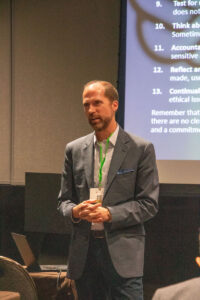As part of the Christian Legal Society National Conference in Boston on October 5-8, 2023, Professor of Law and Associate Dean Natt Gantt delivered an interactive presentation titled “Ethical Decision-Making in Situations of Uncertainty.” The American Bar Association (ABA) Model Rules of Professional Conduct, which serve as the basis for state legal ethics codes across the country, include many provisions which expressly give lawyers discretion as to how to act in certain situations.
Moreover, these rules themselves address only a small fraction of the ethical situations lawyers face. The ABA rules, in fact, recognize their limited scope and state in their Preamble that “many difficult issues of professional discretion can arise” within the rules’ framework and that “[s]uch issues must be resolved through the exercise of sensitive professional and moral judgment guided by the basic principles underlying the Rules.”
Gantt’s presentation thus considered the questions: What moral principles can best guide lawyers in these situations of ethical uncertainty? How might lawyers apply those principles in a decision-making framework that provides both direction and flexibility?
The workshop identified common ethical situations lawyers face where the rules give them discretion or do not address at all and outlined decision-making frameworks lawyers can draw upon in addressing these situations. The workshop also analyzed hypothetical scenarios to operationalize these frameworks and provided attendees with takeaway tools they can use in their law practice and in their professional life generally.
In reflecting on the presentation, Gantt said, “Despite the rise of generative AI, the human aspects of lawyering, like ethical decision-making, remain critical to the lawyer’s role. The ‘sensitive professional and moral judgment’ lawyers need cannot be done by AI. Having difficult discussions about how lawyers should resolve difficult ethical dilemmas thus remains critical to helping lawyers flourish in the profession. And having such difficult conversations will be part of our curriculum at HPU Law so that our graduates can serve as lawyer-leaders of integrity in the profession.”

